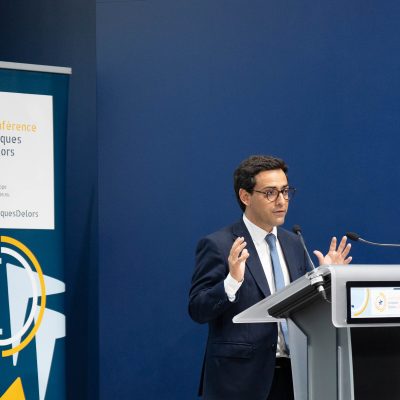Politique budgétaire à l’heure du Coronavirus
Par Andreas Eisl, Chercheur, Institut Jacques Delors
Traduction de l’anglais par Mathilde Durand

Il est temps d’activer les clauses de sauvegarde inscrites dans les cadres budgétaires
La pandémie actuelle du COVID-19, avec ses conséquences graves sur le secteur de la santé publique et le développement économique dans son ensemble, requiert une réponse budgétaire et monétaire forte et coordonnée de la part des décideurs politiques à tous les niveaux de gouvernement en Europe. Même si, à l’heure actuelle, les conséquences exactes de cette crise sont très difficiles à évaluer pleinement, les principes suivants doivent continuer à s’appliquer : pour sauver des vies et atténuer les répercussions négatives de la profonde récession économique qui s’annonce, il est d’une importance capitale que les États membres de l’UE et les institutions européennes s’engagent à dépenser sans limite (dépenser autant que nécessaire pour résoudre la crise) et à assurer le refinancement sans condition de ces dépenses (afin de fournir aux États les liquidités nécessaires pour y parvenir)[1],[2].
Au cours des trois dernières décennies, le Pacte de stabilité et de croissance (PSC), le Pacte budgétaire et les cadres budgétaires nationaux et infranationaux ont considérablement limité la politique budgétaire en Europe. Pour gérer cette crise sans précédent, il convient d’activer les « clauses de sauvegarde » inscrites dans les règles budgétaires ou, au moins, de suspendre temporairement les règles budgétaires pour lesquelles il n’existe pas de telles clauses.
Ce Décryptage analyse dans le détail les clauses inscrites dans les cadres budgétaires qui sont aujourd’hui en vigueur, à la fois aux niveaux européen et national, et qui autorisent à aller au-delà des limites générales du déficit et de l’endettement en cas de circonstances exceptionnelles. Il s’intéresse à l’activation ou non, à l’heure actuelle, de ces clauses par les gouvernements, ainsi qu’aux modalités d’application, et étudie quelles particularités de certains cadres budgétaires seraient susceptibles de limiter la capacité des décideurs politiques à répondre correctement au défi majeur que constitue cette épidémie.
Ce Décryptage fait également plusieurs propositions : (1) adopter l’interprétation la plus large possible des clauses de sauvegarde existantes pour créer une marge de manœuvre suffisante, (2) s’assurer d’une application cohérente des clauses de sauvegarde à tous les niveaux de gouvernement, et (3) suspendre ou adapter les cadres budgétaires existants lorsqu’ils ne prévoient pas de clauses de sauvegarde ou limitent excessivement la politique budgétaire, qui est décisive dans cette situation extraordinaire.
La clause de sauvegarde du Pacte de stabilité et de croissance : un engagement explicite en faveur d’une interprétation large
Depuis son entrée en vigueur en 1997, le Pacte de stabilité et de croissance (PSC) limite la politique budgétaire nationale des États membres par le biais d’un ensemble de règles budgétaires et d’institutions. À la suite de la grave crise de 2009, les réformes du Six-Pack de 2011 avaient instauré une clause de sauvegarde autorisant les États membres à déroger temporairement aux règles budgétaires pour répondre à des « circonstances inhabituelles » échappant au contrôle des États. Pour que cette clause soit applicable, ces circonstances doivent avoir un impact majeur sur la situation financière du secteur de l’administration publique d’un État membre spécifique ou, après une grave récession économique, sur celle de l’ensemble des États membres[3]. Ces dérogations aux règles budgétaires doivent néanmoins être cohérentes avec la viabilité budgétaire à moyen terme des pays. Par ailleurs, le Pacte budgétaire, de nature intergouvernementale, comporte également une clause de sauvegarde en cas de circonstances exceptionnelles, avec une référence directe au PSC[4].
La pandémie actuelle, avec toutes ses conséquences, relève sans aucun doute de « circonstances exceptionnelles ». La Commission a déjà confirmé cette position le 13 mars[5], en affirmant que « toute la flexibilité » du PSC allait être utilisée. La Commission a notamment souligné que « les mesures de soutien, comme celles requises de toute urgence pour i) limiter et enrayer la pandémie, ii) garantir un soutien aux entreprises et secteurs sous forme de liquidités, et iii) protéger les emplois et revenus des travailleurs affectés, peuvent être considérées comme des dépenses budgétaires ponctuelles »[6], et qu’elles seraient donc exclues des exigences européennes en termes de règles budgétaires. Pour le moment, la Commission a donc prévu des exemptions ciblées des règles du PSC, directement liées à la limitation de la propagation du virus[7].
Cependant, dans la même communication, la Commission affirmait également que la clause de sauvegarde pourrait être activée dans son interprétation la plus « large », permettant d’exclure ces mesures plus fortes de soutien budgétaire des limites du déficit et de l’endettement auxquelles les États membres doivent normalement se conformer. Les revenus fiscaux en Europe allant probablement connaître une forte baisse au cours des prochains mois, il semble nécessaire d’accepter l’application de cette définition plus large de la clause de sauvegarde inscrite dans le cadre budgétaire européen. Juste avant la publication de ce Décryptage, le 20 mars, Ursula von der Leyen avait fait une annonce allant précisément en ce sens[8], et la décision de la Commission avait été très bien accueillie. Une intervention rapide et décisive des pays de l’UE est essentielle pour éviter que la crise actuelle n’ait des effets négatifs à long terme par le biais d’un effet d’hystérèse ou d’autres conséquences économiques négatives. Il est par ailleurs crucial de se rappeler des leçons tirées de la dernière crise financière. Alors que d’importantes mesures de relance budgétaire avaient été lancées en 2009, les efforts de consolidation budgétaire qui avaient suivi dès 2010 avaient en fait commencé trop tôt, ce qui avait renforcé la crise de la dette en Europe et donc conduit à une récession à double creux dans de nombreux pays européens.
La Commission devrait aussi garder cela à l’esprit lors de l’élaboration des trajectoires nationales de consolidation budgétaire après l’épidémie de COVID-19. Comme l’indique le « Vade-Mecum » de la Commission, l’activation de la clause de sauvegarde du PSC ne « signifie pas qu’il faut remettre à plus tard l’ajustement budgétaire, sans discernement. Au contraire, la trajectoire d’ajustement doit être adaptée à chaque pays, pour tenir compte des circonstances exceptionnelles de la grave crise économique dans la zone euro ou l’UE dans son ensemble »[9]. Il souligne également que les dérogations temporaires aux règles budgétaires peuvent « être autorisées ex ante ou ne pas être prises en compte ex post ». Pour l’année 2020, et peut-être dans une moindre mesure dans les années à venir, la Commission devrait offrir une « carte blanche » aux États membres dans leur lutte contre la crise actuelle. Dans la situation présente, nous n’avons pas besoin de discussions politiques complexes entre les États européens et les institutions sur les mesures exactes à adopter, qui dépendent souvent des structures économiques, politiques, et sociales de chaque pays, il faut plutôt une action commune décisive mise en place par tous. Ces détails ne devraient revenir au cœur des débats que lorsque nous aurons plus de visibilité sur l’ampleur du choc économique et sur l’impact des mesures nationales pour l’atténuer ; c’est à ce moment-là qu’il faudra aussi répondre à la question de la viabilité budgétaire.
Ce que l’on entend par « carte blanche », c’est le fait d’offrir des conditions permettant à chaque pays touché par la pandémie d’utiliser tous les moyens budgétaires nécessaires pour garantir le bon fonctionnement du secteur de la santé et de maintenir les individus et entreprises à flot sur le plan financier. Pour amortir au mieux la récession économique au niveau européen, une coordination des mesures de relance budgétaire des différents États membres est bien entendu nécessaire. Les pays disposant d’une plus grande marge de manœuvre (comme l’Allemagne et les Pays-Bas) doivent notamment engager des actions budgétaires audacieuses pour soutenir l’économie européenne.
Compte tenu de la nature exogène du choc actuel, il est absolument crucial que la Banque centrale européenne (BCE) et les banques centrales des pays non-membres de la zone euro s’assurent que les politiques monétaires soutiennent les mesures budgétaires des gouvernements nationaux. À cet égard, des mesures encourageantes ont été prises avec la création du Programme d’achats d’urgence face à la pandémie (Pandemic Emergency Purchasing Programme (PEPP)) le 18 mars 2020[10].
Les clauses de sauvegarde dans les cadres budgétaires nationaux
La possibilité de déroger aux cadres budgétaires de manière discrétionnaire n’existe pas uniquement au niveau européen mais aussi aux niveaux national et infranational. Le Pacte budgétaire ainsi que les législations du Two-Pack et du Six-Pack ont joué un rôle clé dans la promotion de ces règles budgétaires et de ces institutions. Certains cadres budgétaires dans les États membres de l’UE existaient néanmoins avant les dernières crises et reposaient sur des initiatives de politique intérieure.
De nombreux cadres budgétaires nationaux mis en place pour respecter les exigences des législations supra- et intergouvernementales sont conçus sensiblement sur le modèle du cadre budgétaire européen, y faisant souvent une référence directe. Cela signifie que les clauses de sauvegarde nationales sont généralement déclenchées automatiquement, en parallèle de l’activation de la clause de sauvegarde européenne. Pour ces pays (par exemple la France[11] et l’Italie[12]), aucune action ni aucun effort de coordination supplémentaire n’est nécessaire pour utiliser la flexibilité prévue dans leur cadre budgétaire.
Certains États européens ont cependant créé des cadres budgétaires nationaux bien plus contraignants que ceux de l’UE. S’ils comportent souvent une clause de sauvegarde (même si ce n’est pas toujours le cas et si, le cas échéant, elle ne fonctionne pas nécessairement comme la clause européenne), ils incluent parfois aussi des exigences plus restrictives pour compenser les déficits et dettes supplémentaires allant au-delà des limites des règles normales (par exemple, en Allemagne, voir Encadré 1). La nature constitutionnelle du cadre budgétaire national dans certains pays renforce la pression pour respecter les règles, en réduisant la flexibilité pourtant nécessaire en certaines circonstances exceptionnelles.
Encadré 1 – Les exigences constitutionnelles de la clause de sauvegarde relative au « frein à l’endettement » en Allemagne
Le « frein à l’endettement » inscrit dans la Loi fondamentale allemande autorise à la fois le gouvernement fédéral (Bund) et les gouvernements des États fédérés (Länder) à activer la clause de sauvegarde « en cas de catastrophes naturelles ou de situations d’urgences exceptionnelles hors du contrôle de l’État et affectant gravement la situation financière de l’État »[13]. Pour déclarer l’existence d’une telle situation à l’échelle fédérale, une majorité absolue est nécessaire au Bundestag allemand. Comme le stipule par ailleurs la Loi fondamentale allemande dans son article 115 (2), l’utilisation de cette clause de sauvegarde doit être associée à l’adoption d’un « plan de remboursement » pour les dettes contractées au-delà des limites du déficit généralement applicables. Elle précise par ailleurs que ce remboursement doit être effectué dans un « délai raisonnable »[14].
À cet égard, le frein à l’endettement allemand va au-delà des exigences du cadre budgétaire européen. Si les trajectoires nationales de consolidation budgétaire peuvent être différées par l’activation de la clause de sauvegarde européenne, autorisant ainsi une augmentation de la dette non prévue auparavant, le cadre budgétaire allemand requiert que toute dette supplémentaire soit remboursée afin d’éviter toute accumulation de dette au fil du temps. Tout particulièrement à la suite d’une crise exceptionnelle, cela pourrait conduire à insister trop lourdement sur la consolidation budgétaire, ce qui pourrait entraver la reprise économique après la récession.
Cependant, comme l’indique Bajohr (2016:34), le Parlement allemand dispose d’une certaine marge de manœuvre dans l’interprétation de l’extension de cette clause de sauvegarde, dans la mesure où il peut à la fois modifier les plans de remboursement initiaux mais également décider de ce que signifie « délai raisonnable »[15]. À cet égard, les responsables politiques allemandes devraient avoir une certaine indulgence dans l’interprétation de leur propre Loi fondamentale et offrir à la politique budgétaire une marge de manœuvre suffisante au cours des années qui vont suivre l’épidémie actuelle. Cela vaut aussi pour les autres pays, tandis que la BCE doit s’assurer que les gouvernements nationaux disposent d’une marge de manœuvre suffisante pour répondre aux impacts économiques immédiats et de moyen terme de la crise actuelle.
Selon les cadres budgétaires nationaux de chaque pays, l’activation d’une clause de sauvegarde ainsi que son abrogation relèvent soit du gouvernement, soit du Parlement, soit d’organes indépendants, qui sont généralement des conseils budgétaires nationaux intégrés aux cadres budgétaires nationaux. Dans certains pays, le rôle des conseils budgétaires est plutôt d’évaluer si l’activation d’une clause de sauvegarde par le gouvernement est justifiée. Dans les mois à venir, il est impératif que les personnes prenant ou évaluant les décisions relatives aux clauses de sauvegarde des règles budgétaires nationales soient attentives à la gravité de la crise actuelle et à la nécessité de prendre des mesures budgétaires décisives comme moyen d’atténuer les conséquences économiques.
Les clauses de sauvegarde inscrites dans les cadres budgétaires nationaux et infranationaux devraient être interprétées avec souplesse, comme au niveau européen. Il conviendrait de faire preuve d’une certaine indulgence à l’égard des plans de consolidation budgétaire requis pour définir la trajectoire post-crise.
Certains États membres de l’UE ne disposent pas d’une clause de sauvegarde « classique » dans leurs cadres budgétaires nationaux. Ainsi, en Slovaquie, une règle relative à l’endettement, basée sur les critères de Maastricht mais plus stricte en termes de limites de l’endettement, est liée à des sanctions quasi-automatiques lorsque certaines limites sont atteintes. Si le cadre budgétaire slovaque a été établi à une époque de faible endettement public, une réaction forte du gouvernement national pourrait rendre nécessaire d’atteindre les niveaux d’endettement qui déclenchent les mécanismes de sanction nationaux inscrits dans la constitution du pays[16]. Ce cadre fait aussi référence à un certain nombre de circonstances dans lesquelles ces sanctions ne devraient pas être activées (guerre, forte baisse du PIB nominal, catastrophes naturelles), mais il ne s’agit cependant pas du même type de clauses de sauvegarde que celles existant au niveau européen.
Si l’épidémie actuelle n’est pas considérée comme relevant de l’une de ces trois exceptions (elle pourrait relever du paragraphe sur les catastrophes naturelles), et si une augmentation de la dette publique devait faire courir au pays le risque de sanction le plus élevé, un vote de défiance serait automatiquement prévu au Parlement. Seul un soutien suffisant au gouvernement pourrait alors suspendre les séries de sanctions les plus drastiques (qui incluent un gel des dépenses) pour une période de 24 mois.
Compte tenu de la nature exogène de la crise actuelle, il pourrait être nécessaire de repenser une telle approche, qui punit potentiellement des gouvernements à qui l’on ne peut rien reprocher en termes d’élaboration des politiques. En raison de la nature constitutionnelle du cadre budgétaire et de la fragmentation du système des partis, il peut être difficile de parvenir à un consensus sur une réforme en ce sens, mais d’autres options, telles que le passage d’un concept d’endettement brut à un endettement net dans le contexte national, pourraient aider à surmonter certaines complications politiques inutiles lorsqu’il s’agit de réagir pour atténuer un choc massif et s’en remettre.
La nécessité de garantir une approche cohérente des clauses de sauvegarde aux différents niveaux de gouvernement
Des entités infranationales (Länder, régions, etc.) ont elles aussi établi leurs propres cadres budgétaires, notamment dans les pays fédéraux comme l’Allemagne et l’Autriche. À l’échelle de l’UE, cela vaut tout particulièrement pour l’Allemagne, où les Länder disposent ou partagent un certain nombre de responsabilités importantes en matière de politique économique nationale. Tout particulièrement lorsque les entités infranationales participent à la gestion macro-économique d’un pays et disposent de responsabilités majeures dans le secteur de la santé publique, les cadres budgétaires pourraient poser problème et requérir l’application de clauses de sauvegarde, voire être suspendus afin d’apporter une réponse adaptée à l’épidémie.
Ainsi, l’État fédéré de Haute-Autriche a adopté un frein à l’endettement régional en 2018[17]. Cependant, il comporte une clause de sauvegarde en cas de circonstances exceptionnelles, qui est activée dans le respect du cadre budgétaire national autrichien. Ce cadre est lui-même relié à la clause de sauvegarde européenne. Avant que les mesures de confinement ne soient prises, le gouvernement régional avait déjà décidé d’activer cette clause[18], dans la mesure où les Länder disposent de certaines compétences clés dans le domaine des hôpitaux publics. Pour permettre des actions coordonnées, il semble essentiel d’assurer un lien cohérent entre les clauses de sauvegarde aux différents niveaux de gouvernements.
Dans l’État fédéré de Bavière en Allemagne, le frein à l’endettement régional inscrit dans la constitution ne comporte pas de clause de sauvegarde claire[19]. Le gouvernement bavarois a donc dû déclarer une « situation de catastrophe » pour suspendre le frein à l’endettement du gouvernement fédéré pendant au moins un an[20]. Cela montre que même en l’absence de clauses de sauvegarde inscrites dans les règles budgétaires permettant de réagir à des circonstances exceptionnelles, il est possible de prendre ce type de mesures en cas de besoin et de volonté politique. Parallèlement, cela souligne que les cadres budgétaires devraient, de manière générale, être préparés à faire face à des situations extraordinaires.
En outre, les institutions européennes devraient veiller à garantir une application cohérente de toutes les clauses de sauvegarde à tous les niveaux de gouvernement, en convaincant les pays interprétant leurs clauses de sauvegarde nationales de manière plus restrictive qu’au niveau européen d’élargir la marge de manœuvre budgétaire.
Remarques conclusives
Pour résumer brièvement, pour faire face aux circonstances exceptionnelles actuelles dues au coronavirus, il existe une flexibilité suffisante dans la majorité des cadres budgétaires existants en Europe. Les clauses de sauvegarde intégrées doivent désormais être activées pour permettre des mesures de politique budgétaire décisives et coordonnées soutenues par la BCE. Compte tenu de la nature de l’épidémie actuelle, et des leçons tirées de la crise de la dette en Europe, le soutien apporté par les mesures budgétaires devrait être substantiel et ne pas laisser place trop rapidement à des mesures de consolidation. Quand cela est possible, il conviendrait d’adopter une interprétation souple des exigences en termes de remboursement de la dette et de trajectoires de consolidation. Et lorsque les cadres budgétaires existants ne comportent pas de clauses de sauvegarde ou lorsque les règles institutionnelles risquent de susciter des querelles politiques, les règles budgétaires devraient être suspendues au moins provisoirement, et révisées à moyen terme pour permettre de prendre les mesures budgétaires adaptées lorsque le prochain choc exogène touchera les États membres.
Les seuls moyens de sortir relativement indemne de cette période difficile consistent à engager les ressources nécessaires pour relever de manière coordonnée l’immense défi posé par l’épidémie, et d’assurer leur refinancement par le biais de la BCE. Cela contribuera aussi à protéger et à renforcer le projet européen à long terme.
Si le principal message de ce Décryptage était d’utiliser réellement tous les moyens budgétaires nécessaires pour surmonter les difficultés actuelles, cela ne signifie pas que les gouvernements ne doivent pas être attentifs à l’identité des destinataires et aux causes justifiant ces flux monétaires. Si cette crise doit nous offrir une opportunité, c’est bien celle d’utiliser la puissance budgétaire exceptionnelle de l’UE pour répondre à une situation exceptionnelle afin d’orienter l’économie vers un modèle économique et environnemental plus durable, conforme aux ambitions du Pacte vert européen de la Commission.
[1] Guttenberg, Lucas & Hemker, Johannes (2020): Corona : un filet de sécurité européen pour accompagner la réponse budgétaire. Décryptage, IJD. (13.03.2020).
[2] Claeys, Gregory (2020): What should be done to reduce euro-area spreads? Bruegel Blog Post. (18.03.2020).
[3] Regulation 1175/2011 Art. 5 & Art. 9 amending Regulation 1466/97 Art. 5 (1) & Art. 9 (1)
Règlement n° 1175/2011, art. 5 et art. 9 modifiant le règlement n° 1466/97, art. 5 (1) et art. 9 (1).
[4] TSCG Art. 3 (1) c & Art 3 (3) b
[5] Commission européenne (2020) : COVID-19 : la Commission présente une réponse européenne coordonnée pour lutter contre l’impact économique du coronavirus (13.03.2020).
[6] European Commission (2020): Coordinated economic response to the COVID-19 Outbreak. (13.03.2020) [Traduction non officielle]
[7] New York Times (2020): EU to Offer Greater Leeway Under Fiscal Rules for Crisis Spending. (13.03.2020).
[8] European Commission (2020): Communication from the Commission to the Council on the activation of the general escape clause of the Stability and Growth Pact. (20.03.2020).
[9] European Commission (2019): Vade Mecum on the Stability & Growth Pact. 2019 Edition. (02.04.2019) [Traduction non officielle]
[10] ECB (2020): ECB announces €750 billion Pandemic Emergency Purchase Programme (PEPP). (18.03.2020).
[11] Assemblée nationale (2012) : LOI organique n° 2012-1403 du 17 décembre 2012 relative à la programmation et à la gouvernance des finances publiques (LOPGFP).
[12] Parlamento italiano (2012): Legge del 24 dicembre 2012, n. 243.
[13] Deutscher Bundestag (2019): Grundgesetz für die Bundesrepublik Deutschland. (15.11.2019). Art. 115 (2) & Art. 109 (3). [Traduction non officielle]
[14] Bundesministerium der Finanzen (2015): Kompendium zur Schuldenbremse des Bundes.
[15] Bajohr, Stefan (2016): Die Schuldenbremse: Politische Kritik des Staatsschuldenrechts. Springer VS. Wiesbaden.
[16] Slovak National Council (2011): Constitutional Fiscal Responsibility Act no. 493/2011.
[17] Oö. Landtag (2017): Landesgesetz zur Sicherung der Stabilität des öffentlichen Haushalts. Oö. Stabilitätssicherungsgesetz.
[18] ORF (2020): Land OÖ hebt Schuldenbremse auf. (13.03.2020).
[19] Bayerische Verfassung Art. 82.
[20] Merkur (2020): Krise schlägt durch. Börsen-Crash wegen Coronavirus: Radikale Zwangsmaßnahme geplant. (16.03.2020).




